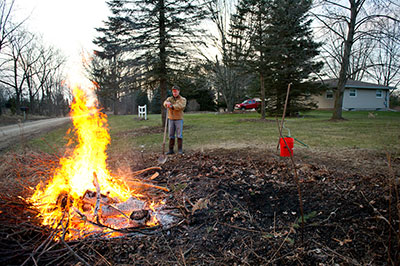Sunday, October 8, 1871. The story goes that a cow on a nearby farm in Chicago knocked over a lantern and burned everything in its surroundings.
In reality, the summer of that year was unusually hot, and as fall came, almost everyone in Michigan, Illinois, and Wisconsin knew the condition wouldn’t change. Instead, it transformed farms, homes, and buildings into a huge kindling.
And so the Great Chicago Fire began in the early evening of that October, destroying acres of land and ending lives. Later in the day, the smoke crossed over to the tiny towns of Michigan, rousing families to shouts of “Fire!”
It took about three days before the flame died, but the story didn’t end there. The Great Lake State has dealt more fires since then. As of May 2021, the Colfax Fire is raging in the north and destroying at least 420 acres of land.
Overall, the state experiences at least 8,000 wildfires and more home fires each year, some of which eventually make it to the headlines because of their severity. It isn’t surprising then that Michigan implements a strict fire prevention code.
For those doing business in the state, here are essential fire-related points that matter:
- Create an Emergency Plan and Involve the Local Firefighters
According to the provisions of the construction and fire codes for enterprises in the state, a business needs to meet three requirements to have an effective emergency plan:
- Firefighter right-to-know, which means both employees and local firefighters need to be aware of the type of hazardous materials used in the establishment and their corresponding danger. In line with this, local firefighters have the right and obligation to inspect the site regularly.
- HAZWOPER, which stands for hazardous waste operations and emergency response. It obligates companies that produce or use chemicals officially labeled as hazardous or dangerous by OSHA (broadly defined as one that can cause physical harm) to prepare for any emergency and train employees in the process. Based on the code, this plan will include first aid and other types of emergency treatment, evacuation procedures and routes, and coordination with outside parties, like firefighters.
- SARA Title III, or the Superfund Amendments and Reauthorization Act. Under this law, industries that produce or use extremely hazardous substances in volumes, which increases the risks of public exposure, may need to make their inventory or chemical data sheet public. Moreover, every county may have to set up a fund to cover emergency response and toxic waste clean-up.
- Work with a Qualified Electrician in the State
Many fires happen because of faulty or old electrical systems. This is especially true in industries that rely on huge power lines. When they are not maintained well, they can still begin a massive wildfire as trees or branches can touch the line.
Electrical wiring is one job that no layperson can do in the state unless they are duly licensed. This means that businesses need to work with an industrial electrician in at least two situations:
- Before installing any electrical equipment in the building
- Altering the electrical system (such as adding or replacing worn wires), especially if the cost of the equipment exceeds $100
Based on the local building code, in these two scenarios, the company needs to obtain an electrical permit. But a qualified contractor can already take care of that.
However, this electrician may need to coordinate with a state-licensed engineer or architect, who has to provide signed-and-sealed building plans and specifications. These are part of the requirements for getting an electrical permit.
The only time that alterations or rewiring won’t ask for a signed plan is if it is considered “minor.” The working area is no more than 3,500 square feet, and the electrical system rating doesn’t go beyond 400 amps.
- Obtain a Mechanical Permit
The 1972 Act 230 of the state says that a building that needs to use specific flammable equipment needs to obtain a mechanical permit. These include water heaters, chimneys and vents, cooling systems, incinerators, boilers, and air pollution control systems.
Businesses can only work with licensed contractors to get the permit. Local firefighters, meanwhile, may inspect the area and the quality and condition of this equipment regularly.
Fires cost a lot of money and endanger lives, but the good news is, in many cases, they are both preventable and controllable. If not, then companies have the means to prepare for an effective emergency action to significantly reduce human and property losses. It begins by following the state building codes and collaborating with the local fire department.
Meta title: Essential Fire Rules for Michigan Businesses
Meta desc: Every year, Michigan experiences thousands of fires. Businesses can decrease their risks of human and property losses with these three tips.

